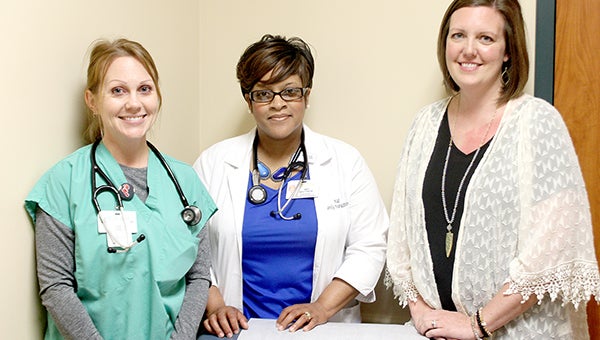Impact of nurse practitioners growing locally
Published 9:54 am Monday, May 22, 2017

- Nurse practitioners Brandi Johnson, left, Nat West, and Erin Bennett help provide care in different specialties at Merit Health River Region. Nurse practitioners are able to provide many of the services doctors provide. (John Surratt | The Vicksburg Post)
Brandi Johnson, Erin Bennett and Nat West are among a small group of people in Mississippi who fill a need in the state’s heath care system.
They are nurse practitioners, registered nurses who have completed advanced education and training in diagnosing and treating medical conditions. They can provide some of the same care provided by doctors and keep a close working relationships with doctors. They can also serve as a patient’s regular health care provider.
Although nurse practitioners have become more prominent over the past few years, they have been working in the health care field since the late ’60s. According to the American Association of Nurse practitioners, the first nurse practitioner program was begun in 1965 at the University of Colorado.
In 1967, Boston College began one of the first master’s degree programs for nurse practitioners.
The are several reasons for the upsurge in nurse practitioners, said Dr. Anne Norwood, a family nurse practitioner and professor in the school of nursing at the University of Mississippi Medical Center.
“Nurse practitioners are filling in gaps where there are not a lot of physicians, or a lot of physicians are wanting to specialize, or they have high patient loads and it’s very hard for them to see all these patients in a day, so they hire nurse practitioners to help them see patients,” she said.
“Also, in rural areas of Mississippi where the only doctor is 25 to 30 miles away, we’re filling that need in areas where physicians may not be available.”
Requirements to be a nurse practitioner include a bachelor’s of science in nursing, prior experience in nursing, and a master’s degree.
The master’s degree is a full-time, two-year program, Norwood said, requiring 630 clinical hours. Once a person graduates, they must complete 720 hours in a specialty in a clinic with a doctor on site before they are allowed to practice on their own.
There are also continuing education programs that must be attended to maintain certification and nurse practitioners must renew their license every two years.
“You are also required to do another 720 hours to get DEA certification to dispense controlled drugs,” said Johnson, a nurse practitioner in the emergency room at Merit Health River Region.
Nurse practitioners, Norwood said, can perform assessments, diagnose, prescribe medications, order labs and treat patients.
“We have our own scope of practice, which is under the board of nursing, and there are some things that we can and can’t do, but a lot of things doctors can do we can do as well. We’re not competition for doctors. We do play a special roll in health care provision.”
What a nurse practitioner can and can’t do, she said, depends on the scope of practice “and where you work.” And nurse practitioners work with collaborating physician they can consult about patients and procedures.
“It’s good having a physician who will back you up,” Norwood said. “All nurse practitioners have to have a collaborating physician to consult and signoff on protocols.
“We do other things besides patient care, and can connect with patients and pickup on a lot of things,” said Bennett, a nurse practitioner at River Region who works in the hospital’s pediatric clinic. “We do a lot more education and more motivation.
“What you can do as a nurse practitioner depends on the specialty you take and who you work with,” she said. “I am a family nurse practitioner and I work in the (pediatric) clinic, so I would not do the procedures they do in the ER, which is acute care.”
And because she does acute care, Johnson said, “I don’t see children under age of 12. My clinicals were in the ER and ICU (intensive care unit), where we do intubation and central lines, arterial lines.”
Hospital or clinic policy can also have an impact on how much a nurse practitioner can do.
“I might be able to put a chest tube in here (at River Region), but I might not be able to put one in someone at another hospital because of the policy and bylaws,” Johnson said.
And while in some areas of Mississippi and other states nurse practitioners may have admitting privileges, nurse practitioners in Vicksburg and Warren County are prohibited from making admissions by hospital policy.
“If someone comes in ill, an internal medicine physician accepts them and makes the determination whether the patient needs to be hospitalized. They do a complete history. I do not admit,” said West, a nurse practitioner and hospitalist at River Region, who cares for patients after they are admitted to the hospital.
“I work in a clinic,” Bennett said. “I cannot admit a patient to the hospital, but if I feel the patient is sick enough to be put in the hospital the collaborating physician in our office will do that for me.
“I can prescribe (medication), but I do not have a license to prescribe controlled substances, because in pediatrics there’s not a need for that, really, but other than that I can write it.
“I can write admitting orders, but they have to be signed by a physician,” Johnson said.
Bennett, who has been a nurse practitioner for seven years, said she went to school to become a nurse practitioner.
She enjoys working in the clinic because “I enjoy seeing the same families over and over and getting to know them and seeing the sibling that are all in one family, and taking care of children whose parents I know because I’ve lived here my whole life.”
West, a nurse practitioner for three years, was a nurse in a clinic for several years before becoming a nurse practitioner. She said working with her patients “is different, it’s a different role for me. My patients change all the time, so it’s not like you get attached to the patients; you get to know them. You look forward to following up with them and following up over the year. The patients change all the time, you see them for two or three days and they’re gone.” She said she has considered going back and getting her certification in psychiatry.
Johnson, a nurse practitioner for five years, initially wanted to become a doctor, but decided to be nurse practitioner so she could spend more time with her family.
“I love what I do because I’m an adrenalin junkie,” she said. “I don’t want to be in a clinic and see people every three to six months, or be in a hospital and see then every two to three days.
“I want to see people take care of their immediate needs and then transfer them to someone who can maintain the rest of their treatment.”






